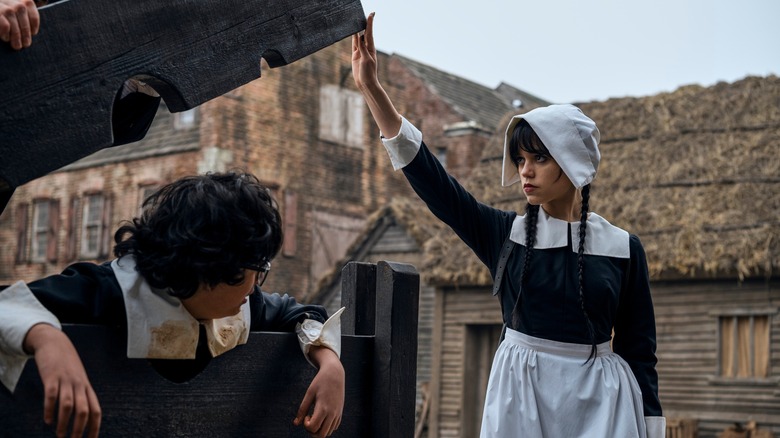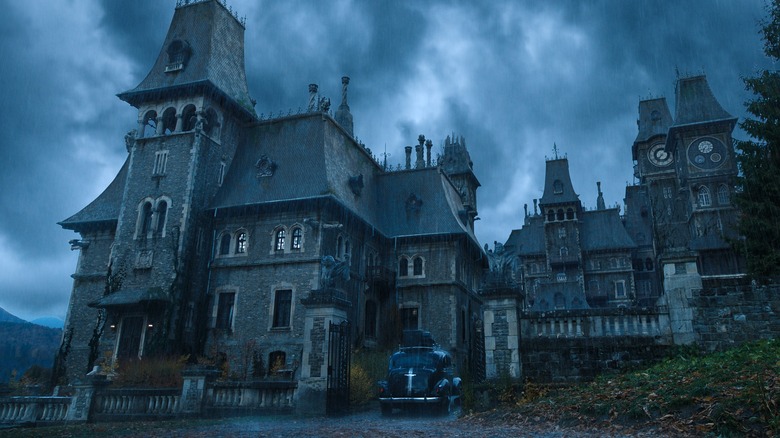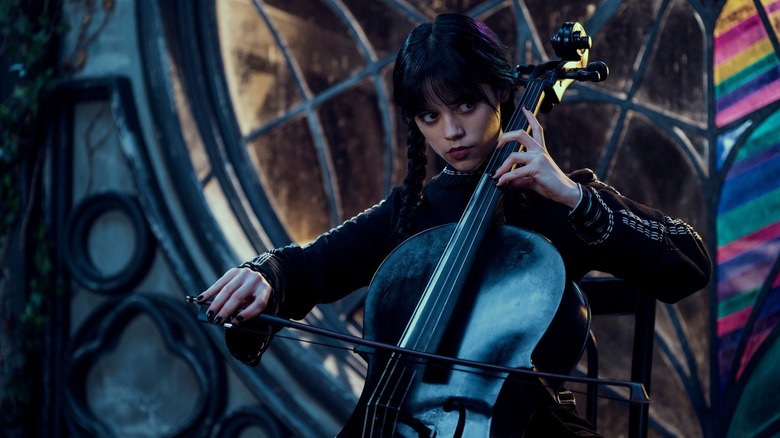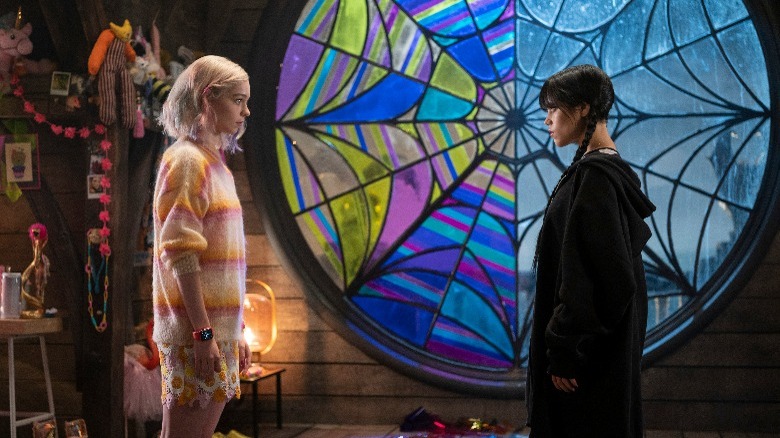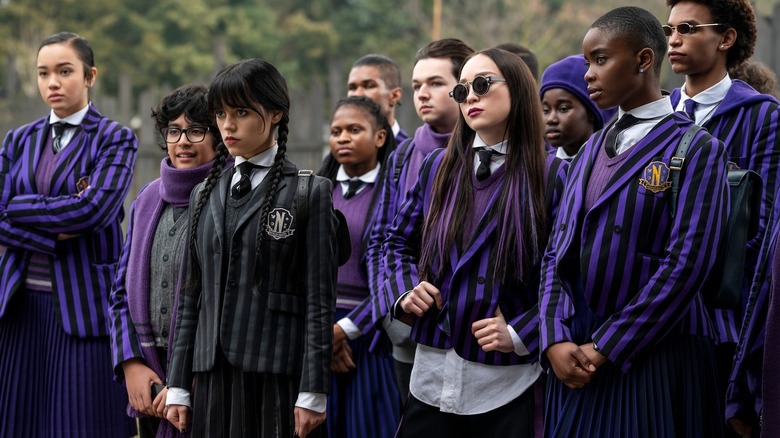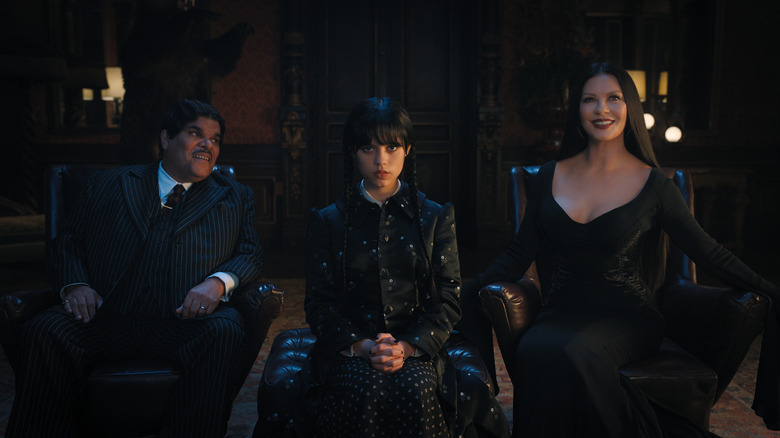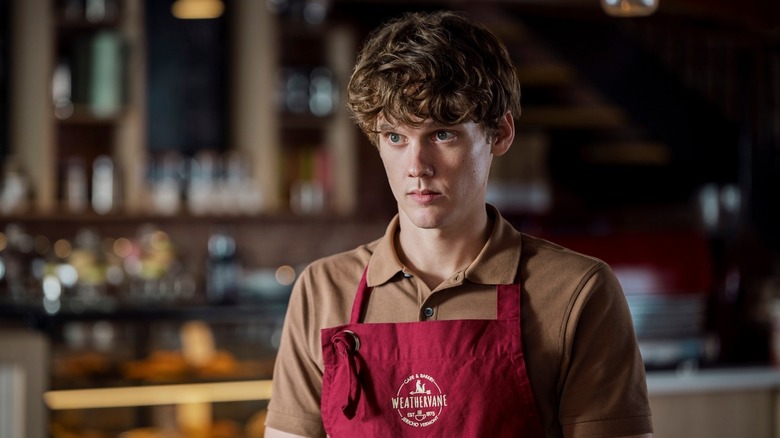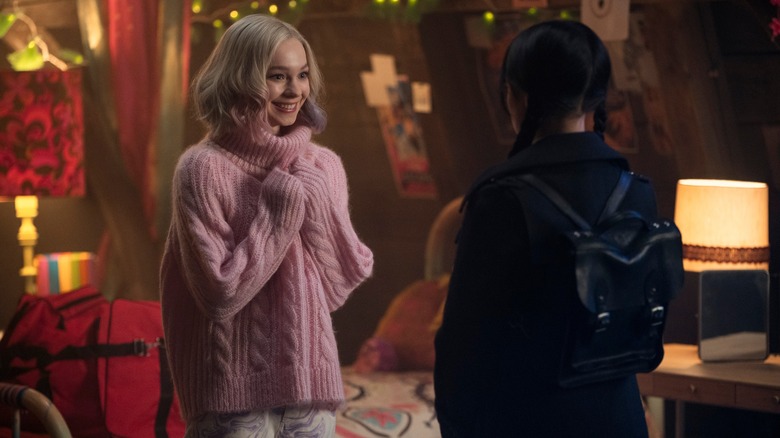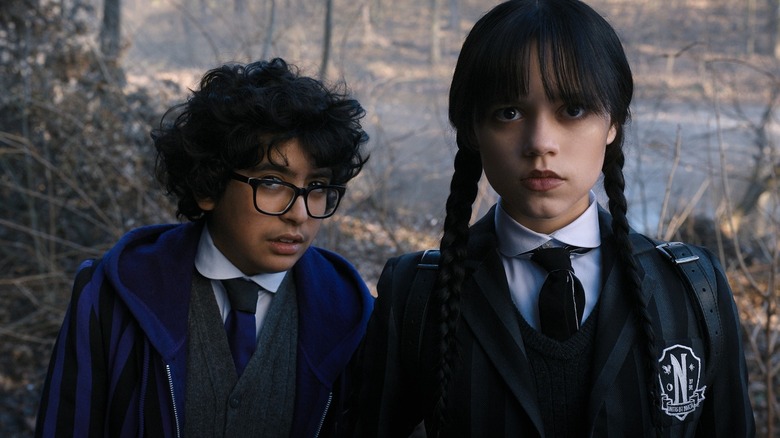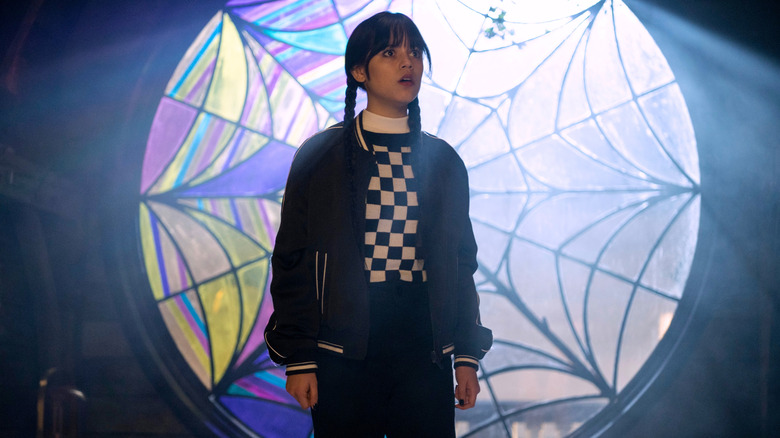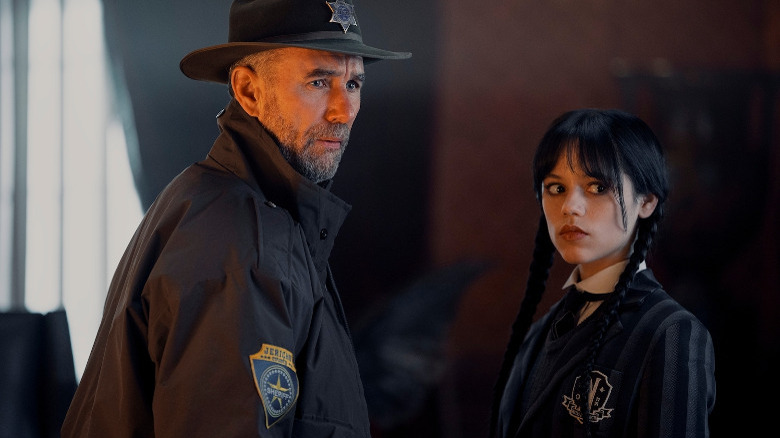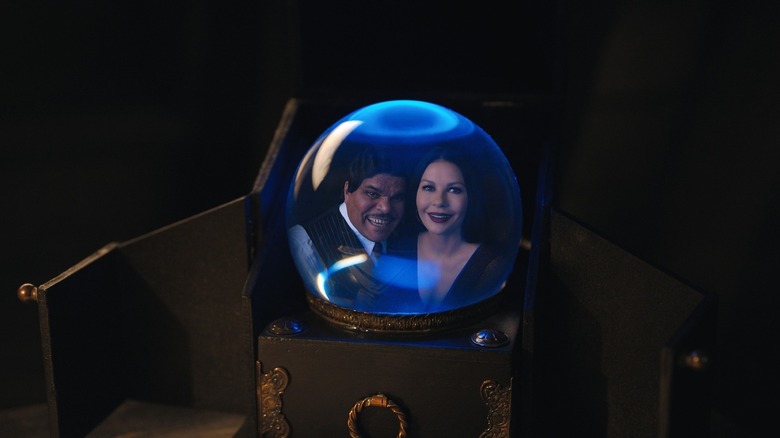The Ending Of Wednesday Explained
Contains spoilers for "Wednesday."
Netflix's "Wednesday" is more than just your average reimagining of Charles Addams' classic comic strip characters, it is a young adult mystery series full of plot twists, red herrings, and lots and lots of lore. Created by the same duo who brought us "Smallville" — Alfred Gough and Miles Miller — and executive produced and co-directed by spooky visionary Tim Burton, the series depicts a world where society is split into two categories: outcasts and normies.
Normies are your average, run-of-the-mill humans and outcasts are anything supernatural. It's like "Harry Potter" if the muggle world knew about wizards and other magical creatures. There's even a school for outcasts called the Nevermore Academy, where mysteries and secrets abound. The outcasts of the series aren't all that different from the normies –they use the same vernacular and love social media — but the fact that they can transform into monsters or have psychic visions is enough to make them a marginalized group.
For an eight-episode season, there is a ton of stuff going on in "Wednesday." Between the various mysteries, character arcs, and social commentary, it can be easy to lose your footing towards the end of the series. That's why we're breaking down all of the most important plot details and themes to clarify any lingering questions you might still have knocking around your skull after "Wednesday" comes to an end.
Jericho, 1625
Everything happening in the explosive finale of "Wednesday" is tied to a maniacal colonizer who founded the village of Jericho named Joseph Crackstone (William Houston). He is a vile and devious man who hates outcasts. Even though the outcasts lived in this part of North America before he and his ilk ever arrived there, he wants to eradicate them from the face of the Earth. This also sets the stage for the show's exploration of bigotry through a fantastical lens.
One of those outcasts is an ancestor of Wednesday Addams, who also happens to look exactly like her, named Goody Addams. Her family is killed by Crackstone, but she escapes and vows vengeance. She kills Crackstone, curses his soul, and puts him in a casket sealed with a blood lock. This is meant to ensure that no one would ever be able to resurrect him.
Following Crackstone's death, the Nevermore Academy is built on his old land and Goody helps form the Nightshade society, which protects outcasts from other angry bigots. If she hadn't done this, there's a chance that Wednesday (Jenna Ortega) would've been forced to fight the resurrected Crackstone alone.
Nevermore, 1990
When Wednesday first arrives at Nevermore, she hears from Sheriff Donovan (Jamie McShane) that her father Gomez (Luis Guzmán) should be locked up for murder. Upon further investigation, Wednesday discovers that when her parents were students at Nevermore, Gomez was accused of killing a normie named Garett Gates (Lewis Hayes). The truth is that Garett was a descendant of Joseph Crackstone tasked with killing everyone at Nevermore with nightshade poisoning.
However, Garett was so obsessed with Morticia (Catherine Zeta-Jones) that he tried to kill Gomez so that he could have her. During their altercation, a vial of nightshade poison shattered in his pocket, killing him. This death is the second event that sends the rest of the plot into motion. It is also an example of how normies simply do not care about or respect outcasts.
Garett had been stalking Morticia and she reported it to Sheriff Walker, who ignored her claims in order to win favor with Garett's obscenely wealthy father — Ansel Gates (Philip Rosch). A year later, he became Mayor Walker (Tommie Earl Jenkins), a post he still holds when Wednesday arrives. This plays into the final battle between Wednesday and the resurrected Crackstone because the only reason he is resurrected in the first place is because of Garett Gates' death.
The disappearance of Laurel Gates
Following the death of Garett, his parents die by suicide. His sister Laurel flees the country and is believed to have drowned later on. However, Laurel Gates fakes her death. Like the rest of her family, she hates outcasts and can't stand the fact that they built a school for them on her ancestor's land (which wasn't really theirs, to begin with) and killed her brother.
So Laurel fakes her death and builds a new identity: Marilyn Thornhill (Christina Ricci). She returns to Jericho and manages to secure a teaching position at Nevermore. The school sees having a normie on the staff as a first step in bringing outcasts and normies together, but it is all a ruse. Thornhill's mission from the very beginning is to resurrect her fallen ancestor and allow him to finish his work.
This line of thinking is reminiscent of modern racists who preach the virtues of the "good old days" — but Thornhill takes it to the extreme by literally bringing someone from the old days back to achieve his bigoted goals.
If you or anyone you know is having suicidal thoughts, please call the National Suicide Prevention Lifeline by dialing 988 or by calling 1-800-273-TALK (8255).
The prophecy
The ending of the season was prophecized around the same time Morticia and Gomez attend Nevermore. A fellow student who is a powerful seer has a vision of the school burning. She recreates the image in a book that is locked away in a library hidden in the lower regions of Nevermore. It depicts a Pilgrim battling a pig-tailed young girl.
That student is so convinced that the girl in the picture will destroy the school that she eventually orders her son Rowan (Calum Ross) to kill her if he sees her. Naturally, he assumes Wednesday is that pig-tailed young girl, so he tries to kill her. Throughout the season, Wednesday also has visions. It seems everyone has an opinion on them and the common consensus is that psychic visions are unreliable.
This turns out to be mostly true as we do see Wednesday confronting a Pilgrim, but she isn't there to destroy the school — she's saving it. This, again, plays into the idea that the way we see the world can be obscured by our biases. As Morticia informs Wednesday, psychic visions are personalized. If you're optimistic (or a dove), you see happy visions. If you're pessimistic (a raven), you see doom and gloom. The woman who prophecized the final battle must have been a raven because she assumed disaster was coming when it was actually salvation.
Outcast amongst outcasts
Nevermore was created to be a safe haven where outcasts can learn and socialize without the fear of being discriminated against. Of course, if you put enough people together, cliques and social groups start to form. Such is the case when Wednesday arrives. While everyone there is considered to be strange and different, they still more or less interact the way normies do.
Wednesday is too weird even for them. That doesn't mean she's incapable of making friends, however. There are other students who don't fit in either. Her roommate Enid (Emma Myers) is a werewolf who can't transform. Eugene (Moosa Mostafa) spends all his time with bees and has zero friends. Xavier (Percy Hynes White) grew up rich with a famous father, but he's nothing like him.
Even Bianca (Joy Sunday), the coolest of the cool kids, doesn't quite fit in because she's a siren. Her voice can control people — even with her medallion that's meant to block her power — so she never knows if the people around her genuinely like her or are compelled by her voice to do what she says. This unifies them and helps create the perfect team to stand up to Thornhill and Crackstone.
Secrets within secrets
We learn that Goody Addams founded a secret society known as the Nightshades in the early days of Nevermore. The society existed to protect outcasts from vindictive normies but lost its charter years before Wednesday arrived. She discovers the location of their headquarters by matching the watermark on the drawing of the prophecy with the statue of Edgar Allan Poe. She then solves the riddle engraved on the statue and gains access to the Nightshade headquarters.
The society still exists because they don't cause any problems for the school and invite Wednesday to join them, but she declines. Even a secret society is too social for her. Still, the fact that she was able to discover them earns her some points. They don't all become her friends exactly, but when she informs them of the fight that is about to take place, they stand with her to protect Nevermore and outcasts in general.
It is because of this alliance (and the help of Wednesday's real friends) that they are able to foil Thornhill's plans and Wednesday could kill Crackstone — for good this time.
Tyler and Hyde
When Wednesday arrives at Nevermore, there's a monster killing people. The sheriff has been telling everyone it's a bear, but bears don't remove body parts and leave with them. Through her investigation, she discovers the monster is called a Hyde (as in Jekyll and Hyde). These beasts are human but transform when triggered by traumatic events or chemical injections. The identity of the Hyde is the main mystery carrying the series.
Hydes are tied to the people who liberate them, considering them to be their masters. Thornhill knows this, and she also knows that the sheriff's son Tyler is a Hyde. Following the death of his mother, Thornhill manipulates him and becomes a surrogate parental figure. She then chains him to a cave, injects him with her elixir, and forces him to transform into a Hyde to kill people and steal their body parts to help her resurrect Crackstone.
This is devastating to Wednesday as she develops feelings for him and he is the first boy she has kissed. Even her own bias leads her in the wrong direction. She assumes Xavier, the tortured artist cool kid, was the Hyde because she is blinded by her feelings for Tyler. This just continues to prove that normies and outcasts are more alike than they'd like to think because their hearts often get in the way of their brains.
The transformation of Enid
Like many of the characters in this show, Wednesday's perky and colorful roommate Enid is at war with herself. On the one hand, she seems to get along with most of the kids at school and always has a sunny disposition, but she is incapable of wolfing out (the term for a human fully transforming into a werewolf) and is ashamed of that. Whenever she tries to wolf out, only her nails change.
She's worried that she will never wolf out and her family will disown her. If she isn't part of a pack, werewolf society will shun her and she will die alone. This fear drives most of her decisions. She has a blog, gossips, and tries to organize events so she never has to feel alone. However, things start to change when she stands up to her mother and proclaims she is her own person.
From that point on, she stops operating out of fear and begins acting out of love. During the blood moon, when Nevermore is under attack, she finally wolfs out. This could be because the blood moon triggers it, but more likely it's because her best friend Wednesday is in trouble and she wants to save her. With her power, she can subdue Tyler in his Hyde form and protect Wednesday.
Principal Weems, Nevermore's defender
The Severus Snape in this "Harry Potter" pastiche is Principal Weems (Gwendoline Christie). Although she is a major antagonist in the series, she isn't the villain viewers are led to think she'd be upon first encountering her. In fact, every decision she's made — from covering up Rowan's death to expelling Wednesday after she tortured Tyler to make him turn into a Hyde — was meant to protect Wednesday, Nevermore, and outcasts in general. She wants to make sure outcasts are never seen as evil or dangerous so they would be accepted by normies.
What's so tragic about this is the fact that her memories of Nevermore aren't the rosiest. While Morticia and Gomez (her peers when she was a student) remember Nevermore being the greatest years of their lives, she recalls mostly disappointment and loneliness. She has every reason to be the villain, but she sees the good in people and that drives her to always do what she believes is the right thing.
Yes, Wednesday and her friends save the school from Thornhill and Crackstone, but Weems dedicates her life to protecting Nevermore — and that makes her a true hero.
Hive code
Eugene is a stereotypical nerd who is so isolated from his peers that the mere fact that his classmates (who also happen to be girls) are willing to visit his beekeeping sanctuary makes him so excited he essentially pledges his life to them. It would be easy to write him off as desperate for companionship — which he certainly is — but it's a little more complicated than that.
Eugene doesn't just help Wednesday with her investigation because he wants a friend, he does so because he believes in hive code. Basically, Eugene understands that every bee in a hive works together to serve and protect the queen. He is so in tune with these creatures that he adapts their social structure (to a certain extent) to his own life. Since Wednesday and Enid are part of his hive (in his mind), he'll do anything for them.
Eugene puts his life at risk by staking out the cave the night Thornhill blows it up and Tyler attacks him. He risks his life again when he realizes Wednesday is confronting Thornhill alone. We also learn that he can influence the bees (kind of like Ant-Man) and he uses this ability to make them swarm Thornhill just in time for Wednesday to impale Crackstone.
Wednesday is the key
During the Poe Cup, Wednesday has a vision when touching Joseph Crackstone's crypt. In it, she is visited by her ancestor Goody, who tells her she is the key. You might think that this is a metaphor, but it's actually literal. After all, Goody trapped Crackstone's body in a casket sealed with a blood lock. As Thornhill explains in the final episode, the only way to open it is to spill the blood of an Addams on the night of a blood moon.
Thornhill sacrifices Wednesday and successfully resurrects Crackstone. However, that's not the only key Goody was talking about. Wednesday is also the only person who can vanquish Crackstone for good by stabbing him in his heart. As she lies there dying the spirit of Goody passes through her thanks to the necklace given to her by Morticia and heals her wounds, freeing her to face Crackstone and end his reign of terror forever.
Pilgrim vs. Outcast
The town of Jericho serves as a visual metaphor for the division happening in the series. It's a quaint town built on stolen land with a massive school meant for outcasts looming over it. Although the money Nevermore brings into the town keeps it thriving, the citizens there hate the fact that weirdos are living on "their land." They have an amusement park called Pilgrim World that teaches people all about the early days of the town's settlement.
It is mentioned in the series itself that this worship of Pilgrims ignores the genocide of native people and whitewashes history. Beyond paying lip service to this, however, the show examines this dichotomy through a visual metaphor. By aligning themselves with the idealized (and inaccurate) depiction of pilgrims, the town of Jericho makes a clear statement that they believe natives don't deserve to exist on their land.
The land Nevermore was built on didn't belong to Joseph Crackstone — it was reclaimed by the outcasts he tried to annihilate. The final showdown between Wednesday and Crackstone seems like an intentional comment on colonization as it is literally the descendant of a long line of outcasts, Wednesday, who battles an actual colonizer, Crackstone.
The story is far from over
In the end, we find out Tyler was the Hyde, learn that Thornhill was controlling him, and finally see Crackstone destroyed. Also, Wednesday learns the importance of hugging and opening yourself up to other people. She even accepts a dreaded cell phone to stay in touch with everyone. It seems like everything is wrapped up nice and neat — until the final scene.
As paramedics transport Tyler to the hospital, he begins transforming into Hyde form, suggesting that we haven't seen the end of him. Additionally, there is still the question of Wednesday's stalker. When examining a music box found in Laurel Gates' room, she finds a secret compartment with photos of herself. Clearly, someone has been following her and taking snapshots.
The easy assumption is that it was Miss Thornhill. As such, her death should mean nobody is stalking Wednesday anymore. However, if that is the case, why does Wednesday gets text messages from an unknown number on her new phone from a number she doesn't recognize? Beyond that, why do those messages contain new photos of Wednesday? That's the problem when your bias gets in the way — it makes you think the world is simpler than it is. However, nothing is ever that simple and there will always be more mysteries to solve.

